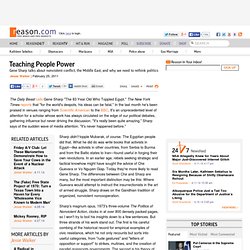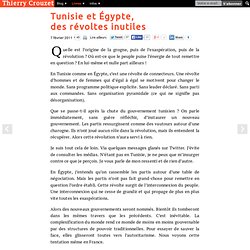

Top Ten Myths about the Arab Spring of 2011. Germany's Forgotten Revolution. Between 1918 and 1923 revolution erupted in Germany.

Open class warfare gripped the country with uprisings, mass strikes and army mutinies. Armed workers clashed with counter-revolutionary paramilitaries. On at least three occasions the fate of German capitalism hung by a thread as workers threatened to take power into their own hands. A socialist revolution in Germany—then the most advanced industrial state in continental Europe—would have brought into question the very survival of the capitalist system itself. It would have ended the isolation of revolutionary Russia, and raised the possibility of revolution spreading across Europe. Only at the end of 1923 could Germany’s bosses breathe a sign of relief that they had survived with their wealth and power largely intact. Teaching People Power. The Daily Beast calls Gene Sharp "The 83 Year Old Who Toppled Egypt.

" The New York Times reports that "for the world's despots, his ideas can be fatal. " In the last month he's been praised in venues ranging from Scientific American to the BBC. It's an unprecedented level of attention for a scholar whose work has always circulated on the edge of our political debates, gathering influence but never driving the discussion. "It's really been quite amazing," Sharp says of the sudden wave of media attention.
"It's never happened before. " Sharp didn't topple Mubarak, of course. Sharp's magnum opus, 1973's three-volume The Politics of Nonviolent Action, clocks in at over 800 densely packed pages, so I won't try to boil his insights down to a few sentences.
Intervention? Libya. Revolution U - Otpor, CANVAS, Burma, and the Egypt Revolution - By Tina Rosenberg. Early in 2008, workers at a government-owned textile factory in the Egyptian mill town of El-Mahalla el-Kubra announced that they were going on strike on the first Sunday in April to protest high food prices and low wages.

They caught the attention of a group of tech-savvy young people an hour's drive to the south in the capital city of Cairo, who started a Facebook group to organize protests and strikes on April 6 throughout Egypt in solidarity with the mill workers. To their shock, the page quickly acquired some 70,000 followers. But what worked so smoothly online proved much more difficult on the street.
Police occupied the factory in Mahalla and headed off the strike. The demonstrations there turned violent: Protesters set fire to buildings, and police started shooting, killing at least two people. The botched April 6 protests, the leaders realized in their aftermath, had been an object lesson in the limits of social networking as a tool of democratic revolution. Listen to how we are responding to the Arab street’s scream for democracy.
Answer to Palestine's liberation lies in Cairo. What an extraordinary coincidence that the leaked Palestine Papers came out at the moment when Egyptians took to the streets against Hosni Mubarak’s dictatorship.

It dramatised the desertion of Palestine by its leadership and its potential substitution by something far more profound—the Egyptian revolution. Mohammed Rabah Suliman is a student in Gaza. He wrote on the The Electronic Intifada, website, “As if physically taking part in Egypt’s revolution, Gaza youth like myself feel themselves at the heart of it and follow it as if it were our own… “One friend told me, ‘This intifada is the old Arab dream. I watched the unfolding events and felt that the Egyptians’ freedom is my freedom as a Palestinian.
The Palestine Papers—thousands of Palestinian Authority internal documents leaked to Al Jazeera and the Guardian—exposed the surrender of Palestinian leaders to the demands of the Israeli state. This reflects a fundamental flaw in the leaders’ strategy. Revolt To predict is impossible. Severe. D'une révolution l'autre.
Tunisie et Égypte, des révoltes inutiles. Quelle est l’origine de la grogne, puis de l’exaspération, puis de la révolution ?

Où est-ce que le peuple puise l’énergie de tout remettre en question ? En lui-même et nulle part ailleurs ! En Tunisie comme en Égypte, c’est une révolte de connecteurs. Une révolte d’hommes et de femmes qui d’égal à égal se motivent pour changer le monde. Sans programme politique explicite. Que se passe-t-il après la chute du gouvernement tunisien ?
Je suis tout cela de loin. En Égypte, j’entends qu’on rassemble les partis autour d’une table de négociation. Alors des nouveaux gouvernements seront nommés. En France d’ailleurs où les manifestants de l’automne 2010 ont aussi agi en connecteurs, d’eux-mêmes, sans que les centrales syndicales ou les partis ne soient à l’avant des revendications, des revendications pour le moins tous azimuts. Si Sarkozy était tombé à cette occasion, que se serait-il passé ? Une fois interconnectés, les gens se parlent et plus personne ne peut les faire taire. Rien ne sert de faire la révolution, il faut savoir qu'en faire.